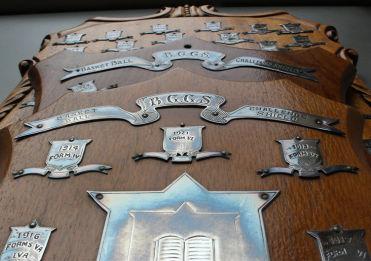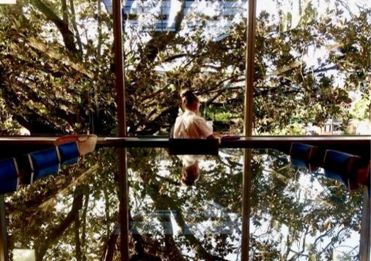Amidst the cheers, colour, and competition of Interhouse Swimming, there is one event that has everyone on the edge of their seat; the final event of the day—the Open 50 m Freestyle Championship final. The fastest 10 swimmers in the School compete for this prized perpetual trophy and goblet. The current record for the race is 27.04 seconds, set by Sarah McLeod (2020) in 2020. Over the years, the race has seen it all: ties; disqualifications; a timing systems failure; and engraving mistakes! However, this prestigious race remains the glamour event of the day, the crowning of the fastest 50 m Freestyle swimmer in the School for that year.

The 50 m Freestyle Championship trophy
Swimming has a significant and meaningful place in Girls Grammar’s sporting history. While it was a commonplace activity in the ‘Colonies’ in the late 1800s, the moral climate largely prevented girls and women from participating. Following the sinking of The Quetta in 1890, when only four of 158 survivors were women—one of whom was past Girls Grammar student, Alice Nicklin (1885)—journalists questioned the lack of swimming education for all children, not just boys (Harvey-Short, 2011).
After this tragedy and the ensuing public outcry, swimming became more acceptable and readily available to girls. Charlotte Pells noted in her Head Mistress Report of 1890 that swimming was ‘recognised as one of the most valuable forms of physical exercise’. She noted that, with the hope of encouraging more girls to develop their prowess at swimming, Sir Charles Lilley offered a series of Speech Day prizes. While only one prize was awarded in 1890 to Annie H Ferguson (1891), who ‘easily distanced all rival competitors’ (Pells, 1890), swimming and swimming awards have become a fixture in the School’s prize lists.
In the early 1900s, intramural swimming competitions were introduced and held at the Spring Hill Baths. A variety of prizes were given, with the most significant being the 25-yards School Championship. In 1911, we see the first mention of a swimming championship, with a Lower School Championship also awarded. In 1912, only one student was awarded the School Championship, which was the terminology used until the late 1950s. Mary Lilley (1913), who was first awarded the Championship in 1910, went on to be the first four-time winner, achieving this recognition from 1910 to 1913. The Lilley family certainly embraced this activity.

Mary Lilley, centre front, captain of the Swimming Club in 1913. Seated next to her is Joan Lilley, second four-time winner (School Magazine, 1913, pg 8)
Intramural sporting competitions have been, and continue to be, an integral part of the School’s life and reflect the QGSSSA sporting calendar. Swimming, one of the QGSSSA modern core sports, has enjoyed this status within the intramural program, whether organised at interform or interhouse competitions. Subsequently, trophies were added to the prize list as the 20th century progressed. Included in the new additions were the Burrell Cup (1915), the Dr Lockhart Gibson Memorial Prize (1917), Lieutenant-Colonel Plant Memorial Cup (1933), and the Lilley Challenge Cup (1964). Disappointingly, two of these trophies have been lost to history: the Dr Lockhart Gibson and the School Championship Cup. However, the Freestyle Championship/Individual Swimming Trophy remains the award presented every year since its inception.
In 1954, the Interform Swimming competition moved to the Valley Baths (Pool). This move, as mentioned in the Annual Report of that year, enabled ‘us to have races of the correct length’ (Crooks, 1954). Barbara Bell (1958) recalled winning the 50 m Freestyle Open Swimming Championship Race from 1955 to 1958, becoming the third four-time recipient of the Championship. Like a number of the recipients of this award, she did not fully appreciate the significance of what she had achieved.
‘They made a bit of fuss the first time I won it in III Form. I didn’t realise the significance until VI Form. I just loved sport of any description!’ (Email, 21/4/23).

1963 Barbara Devenish-Meares (1966) with the School Swimming Cup (most interhouse individual points) and the 50 m Freestyle trophy at Valley Pool
Despite this long history of a Swimming Championship, it was not until 1963 that an actual trophy for the 50 m Freestyle Championship appears to have been awarded. Prior winners of the Championship would receive a book prize or a teaspoon. Barbara Devenish-Meares (1966) was the first student to have received the trophy. She went on to become the fourth (and most recent) four-time winner of this event (1963 to 1966). In addition to the trophy, winners continued to receive a teaspoon as the memento of the award. Alison Bruce (1969) recalled:
‘I won … Freestyle cups in 1968 and 1969 for House Swimming. We could never take these cups home on Speech Night. They had to be handed back at the end of the night. Instead, we were given either a teaspoon or a butter knife with the School’s crest on the top. As a result, I have a weird number of these “trophies” at home’ (Email, 15/9/23).
Today, trophy winners receive a silver goblet rather than a teaspoon.

Karla Rimmington (10L) winner of the School Swimming Championship 2023 holding the silver goblet that winners receive as the memento of their achievement

Sarah McLeod (2020) holding the 50 m Freestyle Championship trophy with the silver goblets for winning both the 50 m Freestyle Championship and School Swimming Championship in 2020
In 1965 and 1966, there appears to be an anomaly in the interpretation of the criteria of the trophy, as it seems that girls scoring the highest individual points at Interhouse Swimming were included and their names appear on the trophy. Magazine reports indicate that the 50 m Freestyle Championship was won by Barbara Devenish-Meares (1966) in both years and she, with four other swimmers, received the School Championship Cup for the most individual House points. This confusion is understandable with the same terminology being used in the prize list for both interschool and interhouse competition, and with only photographic evidence to substantiate the School Championship Cup’s existence.

1968 Interhouse Swimming trophy winners—Back row: Deborah Handley (50 m Freestyle trophy), Megan Thomas (Interschool Swimming Cup—most QGSSSA points), Alison Bruce (School Championship Cup—most Interhouse individual points), Elizabeth Marriott Front row: Lesley Collins (Lt Col. Plant Challenge Cup), Margaret Andrews (Burrell Cup for Relays), Wendy Dixon (Lilley Aggregate Points Cup)

1980 winner Amanda Leeson inspects the 50 m Freestyle trophy and the names of those who have gone before her
Over the history of the Open 50 m Freestyle Championship, as it is now named, other multiple winners have been Jennifer Corish (1961), winner from 1959 to 1961, Sheridan Scriven (1985), winner from 1982 to 1984, Fiona Mackay (2005), winner from 2003 to 2005, and Eliza King (2018), winner from 2016 to 2018. Fiona Mackay recalled her third and final win, and how special the day was for her:
‘My strongest memories come from my senior year. I had been made Swimming Captain and I was very passionate in enhancing the Swimming team’s supporter base for the QGSSSA competition. It was also the first year that both my sisters, Kirsteen (2007) and Megan (2009) were all attending BGGS, and I was excited to show off their individual achievements.
‘I still have strong memories of the final of the 50 m Freestyle Championship … the very last race of the day. By this time the rest of the School has mostly changed and settled back into their seats and so the whole School is watching you. Both my sisters were in the final with me … I entered “the zone”. The gun went off and I flew off the racing blocks and into the water and felt at home. Everything felt smooth and relaxed. It was a new personal best time and I had won the 50 m Freestyle Championship for the third time, in my final year as Swimming Captain, while swimming with my sisters’ (Email, 22/9/23).
What is also special about this race was the overall placings. Fiona placed first, with her two sisters placing second and third, in what is most likely the only time in the Championships history this has occurred. A true ‘sisterhood’ event! Megan Mackay (2009) would later go on to win the event in her final year at school.

Sisters Kirsteen, Fiona, and Megan Mackay: top three finishers in the Open 50 m Freestyle Championship final 2005
This event also heralded Australian representatives. Jennifer Corish (1961), winner from 1959 to 1961, and Minna Atherton (2017), winner in 2013 and 2015 both represented Australia at the Commonwealth Games—Jennifer at Perth (1962) and Minna at Gold Coast (2018) and Birmingham (2022). Minna was one of the youngest winners of the Championship, winning it as a 12-year-old in 2013. Of her win, Minna said:
‘I definitely did not realise the significance of winning when I was in Year 8, as I was just swimming to have fun … (and) just there swimming for Beanland. I didn’t feel any pressure to win or do particularly well and I was definitely surprised that I did. I doubt the girls in the older years were very happy that a little Year 8 girl beat them though!
‘It was always fun to race in front of the School, and as the years went on and I was seen more as “Minna the swimmer” I did feel a bit more pressure to win the 50 free, but since I wasn’t technically a freestyler I always just did it for fun and didn’t let the pressure get to me. I always loved racing for Beanland and for BGGS as the crowd was always so supportive and loud’ (Email, 10/9/23).

Minna Atherton (2017)—2013 Winner
Over the past 113 years, the event has been cancelled only twice: in 1921, when Head Mistress, Annie Mackay, stated it was ‘inadvisable to use the public baths, so we have not held our swimming carnival’ (Mackay, 1921); and in 1951, due to a poliomyelitis epidemic.
Across the decades, the structure of the event (heats are held in the morning with the fastest 10 swimmers going through to the final) and the trophy itself have changed with the times. Barbara Devenish-Meares received a much smaller trophy, which has now morphed into a cascade of four impressive tiers chronicling the skills and exploits of generations of Grammar swimmers. This has grown into a truly inspiring award for such an explosive event!

2023 The Individual Swimming Trophy for the Open 50 m Freestyle Championship, with the fourth layer added in 2016
As Swimming Coordinator from 2000 to 2019, the Open 50 m Freestyle Championship was always my favourite race of the day. It still is! Talking to the finalists prior to the event, announcing the competitors as they stand behind the blocks, and the potent and collective silence in the stadium before the start has always given me that sense of anticipation and the significance of the moment. In less than 30 seconds come the cheers, the euphoria, and the adrenaline burnout. The joy on the competitors’ faces at the end of that special event shows how much they love to race. They may be out of breath, exhausted from a full day of racing, but they emerge from the water smiling, spontaneously ready to congratulate the winner and celebrate the swimming sisterhood.
Jane Martel (1992)
Head of Subject—Health and Physical Education Curriculum Development
Tennis Coordinator
References
Atherton, M. Email 10/09/2023.
Bruce, A. Email 15/09/2023.
Crooks, LW. (1954). Brisbane Girls Grammar School Annual Report 1954.
Harvey-Short, P. (2011). ‘To become fine sportswomen: The history of Health, Physical Education and Sport at Brisbane Girls Grammar School’ Brisbane Girls Grammar School, Brisbane.
Mackay, A. (1921). Brisbane Girls Grammar School Annual Report 1921.
Mackay, F. Email 22/09/2023.
Pells, C. (1890). The Head Mistress Report for the year 1890. Brisbane Girls Grammar School.
Yule, B. Email 21/04/23 and 22/04/23.

Aoife Bedggood (11O) in the 2022 Open 50 m Freestyle Championship Final

Top three placed swimmers in 2018 Open 50m Freestyle Championship Final. L-R – Elzbieta (Ela) Noble (2019) – winner 2019, Catherine McLeod (2018) and Eliza King (2018) – winner 2016 to 2018




